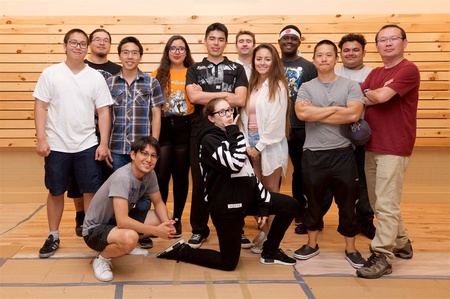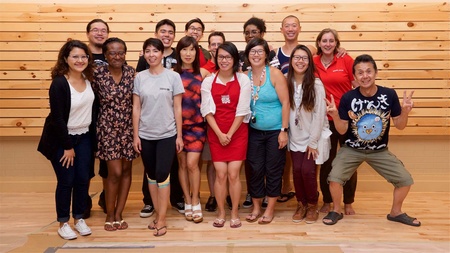My name is Filipe Fukutani, a fourth generation half Brazilian half Japanese born in Brazil. I grew up in a non-traditional household in the suburbs of São Paulo and always identified myself as Japanese. I was raised by my Japanese grandparents, and often had family reunions surrounded by Japanese family and food. Even TV shows I watched always reinforced that thought. Another reason is probably because, as a mixed person, I was always viewed as the minority; since I stood out, I was usually labeled as “the Japanese one.” After moving to Canada in 2003, I made my first “real Japanese” friend and saw how culturally different we were…and that was an eye-opening cultural shock.
In order to try to slowly “absorb” Japanese culture, I had been attending events, such as the local obon called “Matsuri Japon” and the Mochitsuki, since 2008. I also attend many other events related to Japan, including an anime convention called Otakuthon, Canada’s second biggest anime convention. However, it wasn’t until 2015 that I finally started volunteering and getting more involved in these events. I was always shy and afraid to get involved alone.
I started my involvement by becoming a member of the Japanese Canadian Cultural Centre of Montreal (JCCCM) and taking Japanese classes in the winter session of 2015. I had always been studying on and off with friends at language exchange groups, but it was never a serious commitment. I’ve always wanted to know more about my family heritage, to be able to speak with relatives who still speak Japanese, and to learn more about my family history. That same year, I joined as a member of the volunteer security team at the Matsuri Japon for the first time and at the “Mochitsuki”, helping in any way I could. I’ve been volunteering at these two events ever since. I was even made the security leader for the Matsuri in my very second year of volunteering.
The more I got involved, the more I learned about the community and its history, such as how it was founded by families that got relocated from the internment camps in the west coast of Canada. They all formed close bonds and shared similar values, and at the time consisted mostly of Issei (1st generation) and Nisei (2nd generation). Today, the community has a few Nisei who are still very involved, as well as many Sansei (3rd generation), a few Yonsei (4th generation). Now it's much more diverse and open to anybody, including hafus and non-Japanese.
Since I first got involved, I started attending the AGMs (Annual General Meetings) every year, in hopes of giving ideas and suggestions for activities and events to improve the JCCCM. Some of them I managed to get started after only two years of being involved, including language exchange programs, mahjong workshops, and JCCCM’s Instagram account. I have also started partnerships with various local businesses that are either Japanese-owned or Japanese related. Though these partnerships, JCCCM members receive a discount; in exchange participating businesses will promote its presences in the community. It took me one month to contact businesses and get them interested in JCCCM’s mission.
This is something that JCCCM had been in discussion for years prior to my joining; it had never happened perhaps they lacked time and volunteers, which could also explain why there are always very few people attending the AGMs. Maybe it’s lack of communication. I was able to get it done because I had the enthusiasm, the time, and the energy.
I have suggested a few things over the years such as establishing a new website as a priority, but it was shrugged off as low priority in the grounds that “it works” and such changes are unnecessary. I also recommended making a presence at the Otakuthon—Montreal’s biggest anime convention, but this was rejected because they didn’t see how it was relevant. One year at the Matsuri Japon, they tried having a cosplay catwalk alongside other traditional Japanese activities. However, the Issei who attended (and are about 10% of the attendees) complained that such activity was “not Japanese culture”; the activity was dropped. Cosplay is definitely part of the modern Japanese culture, and it’s becoming more and more popular each year…but the Issei fail to see it as such.
In 2019, the JCCCM council got a new member—a young Japanese man who wanted to create an internal youth group and do other changes in the organization. Unfortunately, he quit a few months later, due to the immense amount of bureaucracy and restrictions involved. He ultimately ended up creating his youth group, independent of the JCCCM, where he has a lot more freedom when making decisions.
As someone who studied business administration and has a passion to improve the community center, it is frustrating to see how reluctant to change the current JCCCM council members are. The focus on prioritizing short-term changes over long-term decisions; they prefer plans such as needing volunteers to help paint rooms, instead of improving the website to gain more members and donations. Gaining more members and donation would, in turn, be able to help in not only painting rooms but also filling other community needs. Another example is the renovation of a particular room that got new flooring mostly suited for one group, instead of using a type of flooring that is “less pretty” but good with any activities. As a result, they’re always wasting time covering the floor so it doesn’t get damaged.
It seems the JCCCM council acts in a “Japanese way,” most likely due to the values they learned from their Issei and Nisei parents. That’s very commendable, but they also live their lives in Canada. So I believe they should act more in a “Japanese-Canadian” manner in their decision making, for example be more flexible in their decisions and not do everything black and white. Similar to how I am not fully Brazilian and not fully Japanese, but “Japanese-Brazilian,” JCCCM should take the best of both worlds and make decisions that benefit Japanese-Canadians. I believe that’s how the cultural center can prosper.
I believe the Japanese community in Montreal should have a balance between the western and eastern values. In an ever-evolving world, cultures also evolve and adapt to the current times. Despite all that, there have been times when everybody has come together…most notably in harsh times, such as during the tsunami and earthquake disasters of 2011. We all made fundraisers and did our part to donate and help our motherland Japan. Let’s hope it doesn’t take another disaster to bring people together and that they start trying new things before it’s too late!
* * * * *
Editor’s note: Discover Nikkei is an archive of stories representing different communities, voices, and perspectives. The following article does not represent the views of Discover Nikkei and the Japanese American National Museum. Discover Nikkei publishes these stories as a way to share different perspectives expressed within the community.
© 2022 Filipe Fukutani




